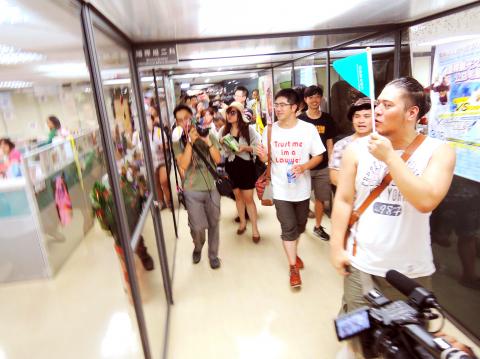Aboriginal activists yesterday organized a “tour group” to visit the Tourism Bureau headquarters in Taipei to protest the agency’s proposal to encourage Chinese tourists attend Ilisin festivals and other traditional events held in Amis Aboriginal communities along the east coast.
“Okay, everyone, look over to your right. We have now arrived at the Tourism Bureau and you can see that the staff here are performing the act of working,” Hualien County resident Namoh Nofu, a member of the Pangcah Amis Defense Alliance who acted as the tour guide, told a group of activists acting as tourists.
“Now, look, there’s a lady on the other side of the office showing us how to make a telephone call,” he said.

Photo: Loa Iok-sin, Taipei Times
“Wow, so this is what the Tourism Bureau people wear at work,” one of the members of the “tour group” said.
“Is there free Wi-Fi here?” another one asked.
Wearing a large straw hat, sunglasses and high heels while carrying a bag of snacks and taking pictures, Lisin Tefi, an Amis from Makuta’ay Village in Hualien County, said that she was dressed like the tourists in their village during festivals.
“Some tourists come to our festivals with absolutely no respect for us. They wander around, littering, taking pictures, making comments aloud about our traditional outfits, asking villagers to pose for them,” Lisin said.
“Some even go as far as asking villagers to take off their traditional outfits and lend it to them for pictures,” she said.
“It’s really very upsetting when such things happen,” she said.
“We would like the staff at the Tourism Bureau to understand how we feel when this happens,” she added.
Several bureau employees seemed to have been bothered by the demonstration and tried to stop the activists by saying: “This is the place where we work, not a tourist attraction.”
“Our villages are places where we live, not tourist attractions either,” the activists said.
The activists were protesting a bureau project to mark the year as “the year of Aboriginal village tourism,” and came up with a list of Aboriginal festivals — including the Amis group’s Ilisin, which is held in every village throughout the summer — for tourists to select events they would like to attend.
“We didn’t come up with the proposal out of disrespect, rather, we planned it with all due respect,” said Lin Hsiu-hsia (林秀霞), director of the bureau’s Technical Division.
“We don’t want to see tourism in Aboriginal villages being controlled by large corporates from the outside,” she said.
“This is why we would like to help Aboriginal communities participate in the planning and actually benefit from tourism in their villages,” Lin Hsiu-hsia said.
On the other hand, Lin Pei-chun (林佩君), director of the bureau’s Planning and Research Division, said it was not the bureau that initiated the project.
“It was eight Aboriginal communities in Hualien and Taitung counties that asked the East Coast National Scenic Area Administration if it could help develop tourism in the villages, and the office referred it to us,” Lin Pei-chun said.
“The mode of tourism development in the eight consenting villages would be in place only in these eight villages; nowhere else,” she said.
The bureau later agreed that it would update its Web site within a week to accent respect for the cultures of the communities, instead of treating Aboriginal festivities purely as tourist events.

Several Chinese Nationalist Party (KMT) officials including Chairman Eric Chu (朱立倫) are to be summoned for questioning and then transferred to prosecutors for holding an illegal assembly in Taipei last night, the Taipei Police said today. Chu and two others hosted an illegal assembly and are to be requested to explain their actions, the Taipei City Police Department's Zhongzheng (中正) First Precinct said, referring to a protest held after Huang Lu Chin-ju (黃呂錦茹), KMT Taipei's chapter director, and several other KMT staffers were questioned for alleged signature forgery in recall petitions against Democratic Progressive Party (DPP) legislators. Taipei prosecutors had filed

Taiwan would welcome the return of Honduras as a diplomatic ally if its next president decides to make such a move, Minister of Foreign Affairs Lin Chia-lung (林佳龍) said yesterday. “Of course, we would welcome Honduras if they want to restore diplomatic ties with Taiwan after their elections,” Lin said at a meeting of the legislature’s Foreign Affairs and National Defense Committee, when asked to comment on statements made by two of the three Honduran presidential candidates during the presidential campaign in the Central American country. Taiwan is paying close attention to the region as a whole in the wake of a

President William Lai (賴清德) has appointed former vice president Chen Chien-jen (陳建仁) to attend the late Pope Francis’ funeral at the Vatican City on Saturday on his behalf, the Ministry of Foreign Affairs said today. The Holy See announced Francis’ funeral would take place on Saturday at 10am in St Peter’s Square. The ministry expressed condolences over Francis’ passing and said that Chen would represent Taiwan at the funeral and offer condolences in person. Taiwan and the Vatican have a long-standing and close diplomatic relationship, the ministry said. Both sides agreed to have Chen represent Taiwan at the funeral, given his Catholic identity and

NEW WORLD: Taiwan is pursuing innovative approaches to international relations through economics, trade and values-based diplomacy, the foreign minister said Taiwan would implement a “three-chain strategy” that promotes democratic values in response to US tariffs, Minister of Foreign Affairs Lin Chia-lung (林佳龍) said. Taiwan would aim to create a “global democratic value chain,” seek to capitalize on its position within the first island chain and promote a “non-red supply chain,” Lin was quoted as saying in the ministry’s written report to the Legislative Yuan submitted ahead of the legislature’s Foreign Affairs and National Defense Committee meeting slated for today. The Ministry would also uphold a spirit of mutual beneficial collaboration, maintaining close communication and consultations with Washington to show that Taiwan-US cooperation